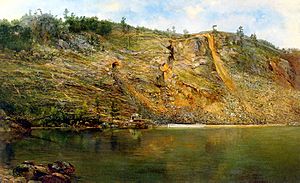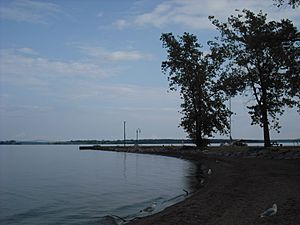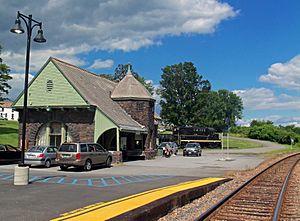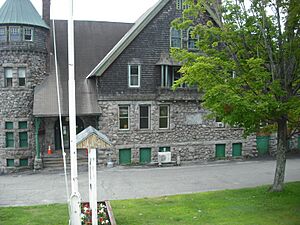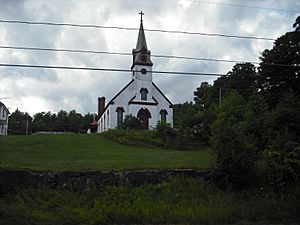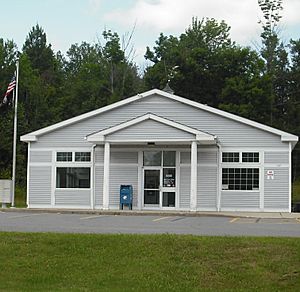Moriah, New York facts for kids
Quick facts for kids
Moriah, New York
|
|
|---|---|
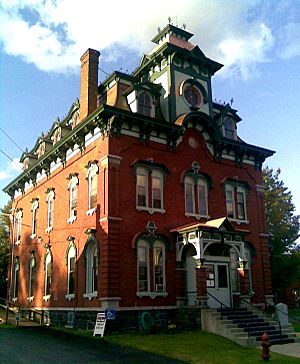
Moriah Town Hall in Port Henry
|
|
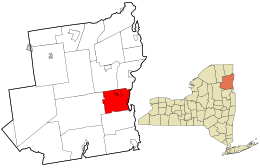
Location in Essex County and the state of New York
|
|
| Country | United States |
| State | New York |
| County | Essex |
| Government | |
| • Type | Town council |
| Area | |
| • Total | 71.11 sq mi (184.17 km2) |
| • Land | 64.49 sq mi (167.03 km2) |
| • Water | 6.62 sq mi (17.14 km2) |
| Elevation | 991 ft (302 m) |
| Population
(2010)
|
|
| • Total | 4,798 |
| • Estimate
({{{pop_est_as_of}}})
|
4,674 |
| • Density | 72.48/sq mi (27.98/km2) |
| Time zone | UTC-5 (Eastern (EST)) |
| • Summer (DST) | UTC-4 (EDT) |
| ZIP code |
12960
|
| Area code(s) | 518 |
| FIPS code | 36-031-48428 |
| GNIS feature ID | 0979238 |
Moriah is a town in Essex County, New York, United States. It is located inside the Adirondack Park. The town is in the eastern part of the county. It is about 47 miles south-southwest of Burlington, Vermont. Moriah is also about 55 miles south of Plattsburgh. The population was 4,798 people in 2010.
Contents
History of Moriah
For thousands of years, different groups of Native Americans lived in this area. When Europeans arrived, the Mohawk lived here. They were part of the Iroquois Confederacy. The Mahican people, who spoke Algonquian, lived to the south.
In 1749, French Jesuits (Catholic priests) invited many Iroquois people to a new village. These Iroquois were mainly Onondaga who were leaving conflicts in western New York. The Jesuits built a mission village and a fort. The Iroquois had to become Catholic to live there. These converted Iroquois were called the "Oswegatchie". They were seen as "nephews" by the Six Nations of the Iroquois.
Moriah and Early Conflicts
The Oswegatchie people joined the French during the Seven Years' War. This war is known as the French and Indian War in North America. They also sided with the British during the American Revolutionary War. This was partly because they had strong trade and cultural ties. After the Seven Years' War, the British won. The government then gave land to some of its soldiers. This land had been given to Britain by the French.
The first permanent European-American settlement here began in 1785. This was after the American Revolutionary War. Most Iroquois allies moved to Upper Canada with the Loyalists. Local Native Americans still hunted in the area at this time. They were called the St. Regis and Oswegatchie Indians. Both groups were Catholic Iroquois, mainly Mohawk and Onondaga.
At first, relations were friendly. But American settlers pushed Native Americans from their hunting grounds. The St. Regis group were Catholic Mohawk. They lived at a reserve called Akwesasne. This land was in both Canada and New York. Today, it is known as the St. Regis Mohawk Reservation in the U.S.
Town Formation and Industry
The Town of Moriah was created in 1808. It was formed from the town of Elizabethtown.
The discovery of iron in the Adirondacks brought a lot of growth to the local economy. Iron was mined and processed here. It was then shipped from Port Henry on Lake Champlain. These iron operations lasted from 1824 until 1971. The Iron Center Museum in Port Henry helps people remember this important time.
For over a hundred years, winter ice-fishing for smelt has been popular. This happens on the frozen Lake Champlain. Tourists come to enjoy this activity with local residents.
Geography of Moriah
The town of Moriah covers about 71.11 square miles (184.2 square kilometers). About 64.49 square miles (167.0 square kilometers) is land. The rest, about 6.62 square miles (17.1 square kilometers), is water.
The eastern border of the town is Lake Champlain. This lake also forms the border with Vermont.
New York State Route 9N is a main road that runs north-south near Lake Champlain. Interstate 87, also called the Northway, crosses the northwestern part of Moriah.
Population and People
In 2000, there were 4,879 people living in Moriah. There were 1,894 households and 1,253 families. The population density was about 75.4 people per square mile. There were 2,253 homes in the town.
Most people in the town were White (94.71%). About 2.79% were African American. A small number were Native American (0.20%) or Asian (0.47%). About 3.30% of the population was Hispanic or Latino.
About 29.0% of households had children under 18 living with them. About 50.8% were married couples. The average household had 2.40 people. The average family had 2.91 people.
The population was spread out by age. About 22.5% were under 18 years old. About 16.9% were 65 years or older. The average age was 38 years. For every 100 females, there were about 110.9 males.
The average income for a household in Moriah was $31,903. For families, the average income was $39,827. About 12.8% of the population lived below the poverty line. This included 17.4% of those under 18.
Communities and Places in Moriah
- Bartlett Pond - A pond near the northern town line, northeast of Mineville.
- Bulwagga Bay - A bay of Lake Champlain, southeast of Port Henry.
- Cheever - An area of Port Henry, north of the village along Route 9N.
- Grover Hills - A small community north of Moriah Center. It is just south of Mineville.
- Mineville - A community northwest of Port Henry.
- Moriah - The main community of Moriah. It is west of Port Henry.
- Moriah Center - A community north of Moriah.
- Mullen Bay - A bay of Lake Champlain, north of Port Henry.
- Newport Pond - A 25-acre pond west of Witherbee.
- Port Henry - A community (it used to be a village) on Lake Champlain. It is the main business center of the town.
- Witherbee - A community near the northern town line. It is just west of Mineville.
Famous People from Moriah
- Tony Adamowicz - A racing car driver.
- Johnny Podres - A pitcher for the Brooklyn Dodgers. He was the MVP of the 1955 World Series. He was born in Witherbee.
- Jonathan Tarbell - Born in Moriah. He was a lieutenant colonel in the 91st New York Volunteer Infantry Regiment. He became a brevet brigadier general during the American Civil War.
- Tom Tyler - A film star from the early 1900s.
- Raymond R. Wright - A recipient of the Medal of Honor from the Vietnam War.
- Wallace T. Foote Jr. - A U.S. Congressman in the 1800s.
See also
 In Spanish: Moriah (Nueva York) para niños
In Spanish: Moriah (Nueva York) para niños
 | DeHart Hubbard |
 | Wilma Rudolph |
 | Jesse Owens |
 | Jackie Joyner-Kersee |
 | Major Taylor |


